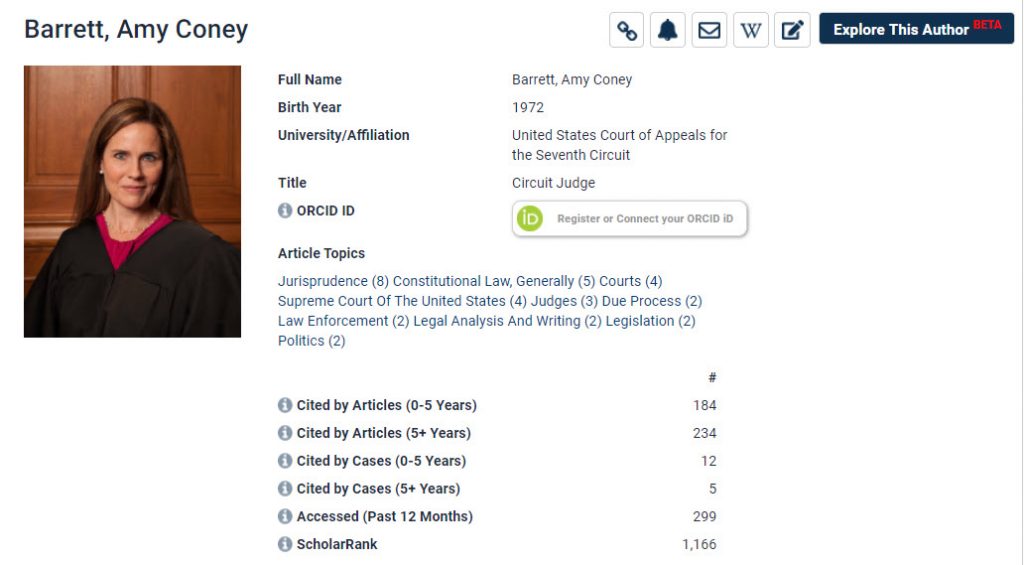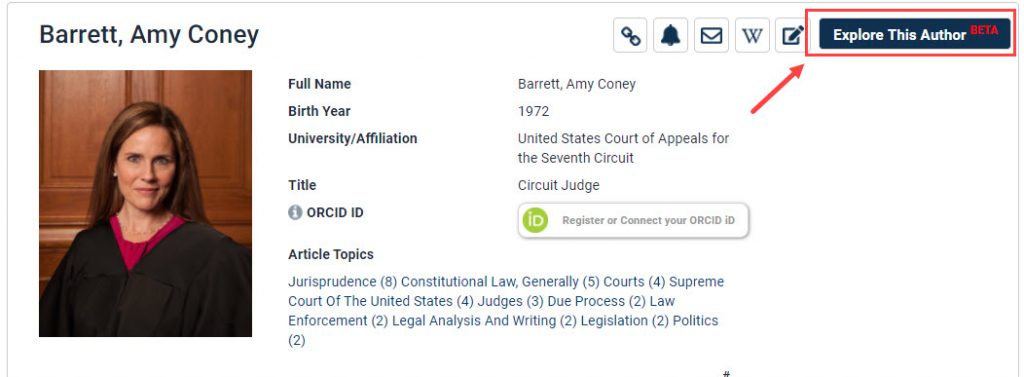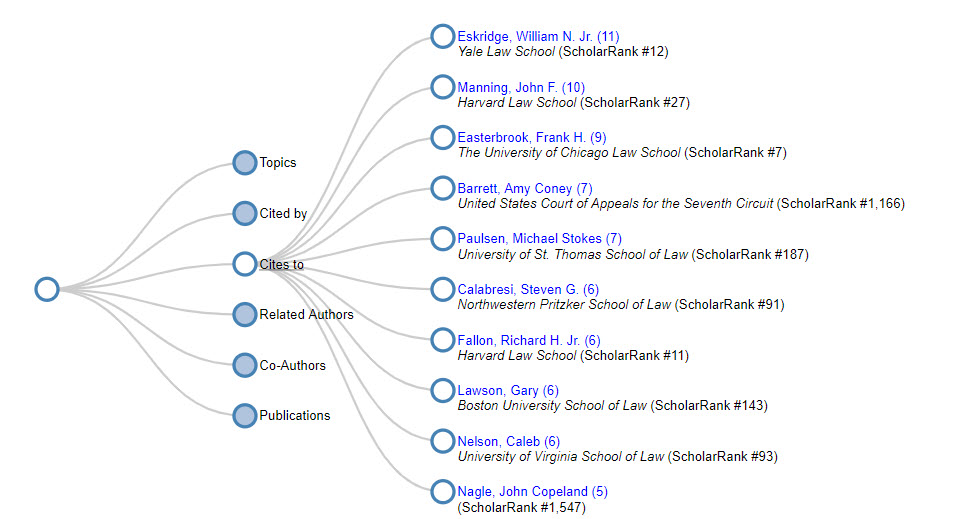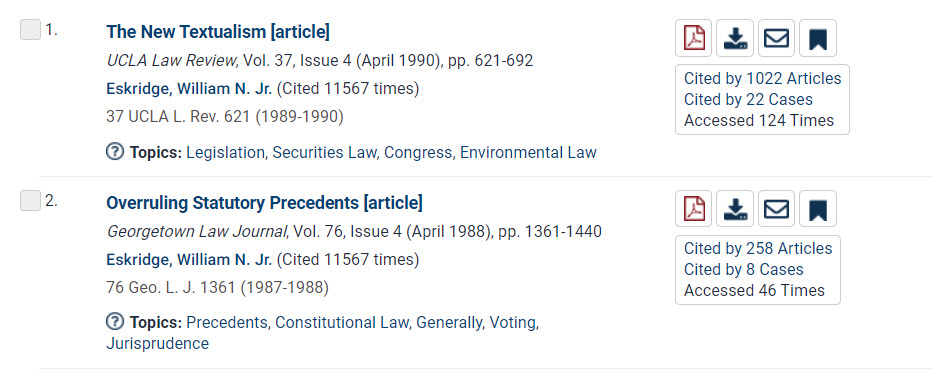The recent passing of Justice Ruth Bader Ginsburg opened up a seat on the United States Supreme Court, just weeks before the presidential election. On September 26th, President Donald Trump nominated Amy Coney Barrett, a conservative federal appeals court judge, to succeed Ginsburg. If confirmed, Barrett would keep the number of women serving on the Court at three, joining Justices Sonia Sotomayor and Elena Kagan. She would also become the youngest member of the Court. Most importantly, she would likey cement a 6-3 conservative majority. Today we will explore Barrett’s career and where she stands on major constitutional issues using HeinOnline.
Education and Career
Amy Coney Barrett studied English at Rhodes College in Tennessee, where she graduated with a Bachelor of Arts magna cum laude. She then attended Notre Dame Law School on a full-tuition scholarship, where she graduated first in her class with a Juris Doctor summa cum laude. During that time, she became an executive editor of the Notre Dame Law Review.
To kickstart her career, she spent two years as a judicial clerk for Judge Laurence Silberman of the U.S. Court of Appeals for the D.C. Circuit and later clerked for Justice Antonin Scalia of the U.S. Supreme Court.
She eventually returned to her alma mater, Notre Dame, in 2002, where she continues to teach federal courts, constitutional law, and statutory interpretation. While at Notre Dame, Barrett has been awarded the “Distinguished Professor of the Year” award three times.
In 2017, Barrett was nominated by President Trump to the U.S. Court of Appeals. During the nomination hearing, she was questioned about a law review article she co-authored nearly 20 years earlier, arguing that Catholic judges should recuse themselves from death penalty cases. Barrett was questioned about how she would handle this as a judge since she herself is a Roman Catholic. She replied that her religious affiliation would not hinder her duties as a judge and was later confirmed by a 55-43 vote.
Learn More with HeinOnline
With HeinOnline’s robust Law Journal Library, users can research Barrett and her views on hot topics. Begin by checking out her author profile page.

Barrett’s author profile page provides more than a dozen scholarly articles; here are her top three cited ones:
- Substantive Canons and Faithful Agency
Boston University Law Review, Vol. 90, Issue 1 (February 2010) - Stare Decisis and Due Process
University of Colorado Law Review, Vol. 74, Issue 3 (2003) - Statutory Stare Decisis in the Courts of Appeals
George Washington Law Review, Vol. 73, Issue 2 (January 2005)
Now, let’s take a brief look at where she stands on some important issues.
Stare decisis is a legal doctrine that generally obligates courts to follow historical cases when making a ruling on a similar case. In Barrett’s article Precedent and Jurisprudential Disagreement, she wrote that stare decisis is not a hard-and-fast rule in the court’s constitutional cases. Barrett wrote, “Because the justices do not all share the same interpretive methodology, they do not always have an agreed-upon standard for identifying ‘error’ in constitutional cases.” She also writes, “One who believes that an overruling reflects votes cast based on political preference must believe that all cases (or at least all the hot-button ones) are decided that way, for there would be no reason for politics to taint reversals but not initial decisions.”
Barrett has reviewed two cases regarding abortion procedures in Indiana. First, in Box v. Planned Parenthood of Indiana and Kentucky Inc., she dissented arguing in favor of an Indiana law that would require doctors to notify parents of any minor seeking an abortion.
In the second case, Commissioner of the Indiana State Department of Health v. Planned Parenthood of Indiana and Kentucky Inc., she was in favor of rehearing two laws: one banning abortions solely based on sex or disability of the fetus and the other requiring abortion provides to bury or cremate fetal remains. These laws were blocked with the reasoning that they violated Roe. v. Wade.
In her article Countering the Majoritarian Difficulty, Barrett criticizes the Supreme Court’s upholding of the Affordable Care Act’s individual mandate as a tax. She writes, “Chief Justice Roberts pushed the Affordable Care Act beyond its plausible meaning to save the statute.” She continued to challenge the legal principle of deferring to past precedents
In 2012, Barrett signed a petition against a rule of the Affordable Care Act, claiming it was a violation of religious freedom to force employers to provide birth control.
While Barrett doesn’t disagree that people who commit serious crimes should be banned from accessing firearms, in the case Rickey I. Kanter v. William P. Barr, Barrett argued that there was not enough evidence to support disarming nonviolent offenders. In her lone dissent, Barrett wrote, “History does not support the proposition that felons lose their Second Amendment rights solely because of their status as felons.”
In Cook County v. Wolf, Barrett dissented against the decision to block the Trump administration’s efforts to further enforce the public charge rule, which allows officials to deny permanent legal status to immigrants who are likely to need public assistance.
In another case, Yafai v. Pompeo, Barrett refused to reconsider the case of a naturalized U.S. citizen who was denied a green card twice. There is a small exception in the law that allows a U.S. citizen to challenge a consular’s office decision, but according to Barrett’s written opinion, “The status of this right is uncertain.”
Check out HeinOnline’s Explore This Author feature from within Barrett’s author profile page to learn more about her scholarly work. With this feature, users can see her most-discussed topics, her co-authors, cited works, and much more. Click the Explore This Author button in her author profile.
Explore this Author

For example, click the Cites to option to see all the authors that Barrett has cited.

Click an author’s name to see the articles Barrett has cited in her scholarly work.

History of Supreme Court Nominations
HeinOnline’s History of Supreme Court Nominations database includes the complete series Supreme Court of the U.S. Hearings and Reports on Successful and Unsuccessful Nominations of Supreme Court Justices by the Senate Judiciary Committee by Roy M. Mersky and J. Myron Jacobstein, and continued by Tobe Liebert and then William H. Manz. This ongoing series is considered to be the definitive documentary history of the nominations and confirmation process of both successful and unsuccessful nominations to the Court up through Brett Kavanagh.
Each nomination includes relevant materials, such as:
- Confirmation hearing and transcript on the nomination
- Senate Judiciary Committee vote on the nomination
- Memoranda drafted
- Presidential statements
- Resignation announcements
- Pre-nomination speculation
- Nomination announcement
- Confirmation date
The Browse by Justice option allows users to link directly to relevant content for each justice. Also included are more than 350 titles related to the Supreme Court, links to scholarly articles, and bibliographies.

But Wait, There’s More!
For even more content, check out these blog posts on the Supreme Court:
- I Dissent: The Life and Legacy of the Incomparable Ruth Bader Ginsburg
- McGift v. Oklahoma: A Historic Win for Native American Rights
- Reigning Supreme: All About the Highest Court in the United States
- Proud to Be Born This Way: A Look Back at the Road to Pride and LGBTQ Rights
- The Life and Career of Supreme Court Justice Hugo Black



